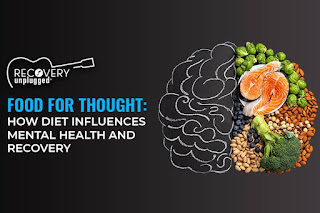The Connection Between Diet and Mental Health
In the hustle and bustle of our daily lives, it's easy to overlook the intricate relationship between what we eat and our mental well-being. The foods we consume play a crucial role in not only nourishing our bodies but also impacting our mental health. In this exploration, we delve into the fascinating connection between diet and mental well-being, uncovering the ways in which our food choices can influence our mood, cognition, and overall mental health.
 |
| The Connection Between Diet and Mental Health |
The Gut-Brain Axis: A Surprising Connection:
One of the key links between diet and mental health lies in the gut-brain axis. This bidirectional communication system between the gastrointestinal tract and the brain is more influential than we might realize. The gut is home to trillions of microorganisms, collectively known as the gut microbiota, which play a pivotal role in digestion and nutrient absorption. Recent research suggests that these microbes may also influence our mental health.
Certain foods, particularly those rich in fiber, act as prebiotics, fostering the growth of beneficial gut bacteria. These bacteria, in turn, produce neurotransmitters such as serotonin—a key player in regulating mood. A diet that supports a diverse and healthy gut microbiome may contribute to improved mental well-being.
Nutrient Powerhouses for Mental Health:
The impact of individual nutrients on mental health is an area gaining increased attention from researchers. Omega-3 fatty acids, found in fatty fish, flaxseeds, and walnuts, have been linked to a reduced risk of depression and may play a role in maintaining cognitive function. Antioxidants, present in fruits and vegetables, help combat oxidative stress, which has been implicated in mental health disorders.
Vitamins and minerals, such as B vitamins, zinc, and magnesium, are essential for neurotransmitter synthesis and function. A deficiency in these nutrients has been associated with an increased risk of depression and anxiety. Including a variety of nutrient-dense foods in our diet ensures we provide our bodies with the building blocks necessary for optimal mental health.
The Influence of Sugar and Processed Foods:
While nutrient-rich foods can bolster mental health, the excessive consumption of sugar and highly processed foods may have the opposite effect. A diet high in added sugars has been linked to an increased risk of depression and anxiety. The rapid spikes and crashes in blood sugar levels that accompany the consumption of sugary foods can contribute to mood swings and irritability.
Processed foods, often laden with artificial additives and preservatives, may also negatively impact mental health. The potential link between the modern Western diet, characterized by high levels of processed foods, and the rising prevalence of mental health disorders is an area of ongoing research.
The influence of sugar and processed foods on our overall health, both physical and mental, cannot be overstated. These dietary choices, often convenient and tempting, can have a profound impact on our well-being.
Sugar and Mood Swings
The allure of sugary treats is undeniable, but the subsequent mood swings can be a harsh reality. Consuming excessive amounts of sugar leads to rapid spikes in blood sugar levels, providing a temporary energy boost followed by a crash. This rollercoaster can contribute to irritability, fatigue, and a general sense of unease.
Sugar and Mental Health
Beyond mood swings, there's a growing body of evidence linking high sugar intake to mental health issues. Research suggests that diets rich in sugar may increase the risk of depression and anxiety. The inflammatory effects of sugar on the body are thought to play a role in these associations.
Processed Foods and Additives
Processed foods, often laden with artificial additives and preservatives, pose another challenge to our well-being. These additives, while extending shelf life and enhancing flavor, may have implications for mental health. Some individuals may be sensitive to certain additives, experiencing mood disturbances or other adverse effects.
Impact on Cognitive Function
The influence of processed foods extends beyond mood to cognitive function. Diets high in refined carbohydrates and processed foods have been linked to cognitive decline. The brain thrives on a well-balanced supply of nutrients, and a diet lacking in essential nutrients may compromise cognitive abilities over time.
The Vicious Cycle
It's important to note the potential for a vicious cycle. Stress and emotional challenges often drive individuals toward sugary comfort foods. However, relying on these foods as coping mechanisms can perpetuate the cycle, as the temporary relief they provide is followed by a crash that may leave individuals feeling worse than before.
Long-Term Health Consequences
The long-term consequences of a diet high in sugar and processed foods extend beyond immediate mood and cognitive effects. Conditions such as obesity, diabetes, and cardiovascular issues, which are associated with these dietary choices, can also have indirect impacts on mental health.
Empowering Dietary Choices
Understanding the influence of sugar and processed foods empowers individuals to make informed dietary choices. Opting for whole, nutrient-dense foods over sugary snacks and heavily processed meals can contribute not only to physical health but also to a more stable and positive mental state.
Moderation and Awareness
Moderation is key. Enjoying an occasional treat is a normal part of life, but being mindful of overall dietary patterns is crucial. Building awareness around the relationship between food choices and mental well-being enables individuals to make decisions aligned with their long-term health goals.
In essence, while the allure of sugary and processed foods is ever-present, recognizing their influence on our mood, cognitive function, and overall mental health is a crucial step toward making mindful and health-conscious dietary choices. Striking a balance that prioritizes whole, nourishing foods can contribute not only to physical vitality but also to a resilient and thriving mental state.
Mindful Eating and Mental Well-Being:
Beyond the specific nutrients in our diet, the way we eat can also influence our mental well-being. The practice of mindful eating encourages us to be present and fully engaged in the act of eating. By paying attention to the sensory aspects of our meals, such as taste and texture, we can cultivate a healthier relationship with food.
Mindful eating may help prevent overeating and emotional eating, both of which can have implications for mental health. Taking the time to savor and appreciate our meals not only enhances the dining experience but can also contribute to a positive mindset.
Personalized Nutrition for Mental Health:
Recognizing the individuality of our bodies and minds, the concept of personalized nutrition is gaining traction in the realm of mental health. What works for one person may not work for another, and tailoring dietary recommendations based on an individual's unique needs and preferences is becoming increasingly important.
Factors such as genetics, lifestyle, and pre-existing health conditions all play a role in determining how our bodies respond to different foods. By understanding and embracing personalized nutrition, we can optimize our diets to support mental well-being on an individual level.
Conclusion:
The intricate dance between diet and mental health is a compelling area of study that continues to unfold. As we gain a deeper understanding of how the foods we consume impact our minds, we empower ourselves to make choices that support not only our physical health but also our mental well-being. By embracing a balanced, nutrient-dense diet and cultivating mindful eating habits, we take significant steps towards fostering a positive connection between what we eat and how we feel. Remember, the journey to better mental health can begin with a plate full of colorful, nourishing foods.


.png)

.png)
.png)
.png)
.jpg)

.jpg)
.jpg)

.png)
.png)

0 Comments